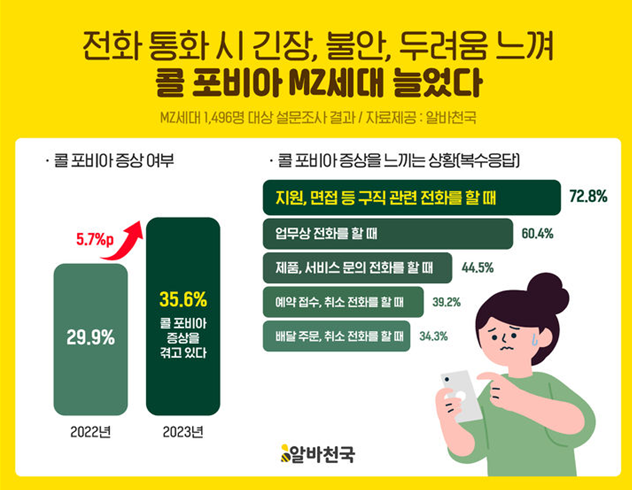Special
- 홈
- 청대 타임즈
- Special
| 제목 | [No.233 Special] Generation MZ Reluctant to Talk on the Phone, also texts part-time job support |
|---|---|
| 카테고리 | Special |
|
Generation MZ Reluctant to Talk on the Phone, also texts part-time job support
The Cheongdae Times Cub reporter YeSeul Jang
Recently, as the number of MZ generations who feel tension, anxiety, and fear when talking on the phone has increased. A survey showed that inquiries related to job search such as part-time job support and interviews mainly use text and chat functions rather than phone calls.
According to a survey of 1,496 people in the MZ generation conducted by "Alba Heaven," a portal specializing in job search and job search, 35.6% were suffering from call phobia up 5.7% from the same survey last year.
Call phobia is a phenomenon whereby one savoids phone calls and prefers to communicate by text message, mobile messenger, or e-mail rather than by phone. Call phobia is a phenomenon that first appeared around 2009, and as conversations and deliveries are solved by pressing a button with a finger, messengers and text messages have become familiar, while phone calls are awkward or scary.
Call phobia is a symptom of social anxiety disorder that avoids social situations. Call phobia is a feeling of negative emotions such as difficulty and fear on a phone call, and in severe cases, anxiety may appear as a physical symptom, such as increased heart rate just by talking on the phone.
These symptoms do not only occur in introverted and quiet people. Rather than paying attention to what will happen or positive effects, such as the contents of the call or the acquisition of information through the call, fear of self-evaluation occurs more.
For this reason, it also appears in active people who have high expectations of themselves and tend to seek perfection. In terms of gender, women (45.7 percent) reported that they were experiencing Call Phobia more than twice as many as men (20.9 percent).
The percentage of respondents who answered that their most preferred method of communication was "text communication such as a text messaging app" also rose from 61.4 percent to 70.7 percent. Preference for text-oriented communication method was also higher among women (75.9 percent).
It turned out that the biggest difficulty for the MZ generation is that they have to answer right away without having time to organize their thoughts.
At the same time, ▲because they are worried that they will not be able to say what they thought properly (55.9%) ▲because they are much more familiar with non-face-to-face communication such as text messages (51.6 percent), ▲because they are worried that they will not understand what the other person is saying (29.5 percent), ▲because they are nervous about their silence when they have nothing to say (24.2 percent), etc. were cited as reasons why it is difficult to make a phone call.
In order to overcome the call phobia, it is helpful to reconstruct a distorted cognitive structure that focuses on negative thoughts rather than the actual calls. Cognitive restructuring helps to positively change the negative perception of a calling situation.
It is a process that allows you to focus on the phone call itself with the medical staff for various negative thoughts that are occurring unknowingly in your mind.
First, in order to gain confidence through basic phone skill training, practice talking on the phone with people you feel comfortable with, such as family and friends. After that, it can be a good idea to write a preliminary scenario for the phone call.
The anxiety or fear caused by the phone is not an objective reality, but only a secret and private thought or emotion in an individual's mind.
If you are not afraid to communicate and face it with a comfortable mindset, you will be able to face your true self without being threatened by negative emotions by accepting and responding flexibly to negative thoughts in your mind.
|
|
| 파일 | |
 언론사
언론사